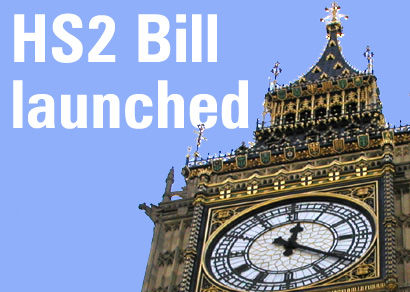THE main legislative framework which would allow High Speed 2 to be built, forming Britain's first domestic high speed railway, begins its controversial journey through Parliament today.
The start of this progress is being accompanied by a chorus of renewed protests from opponents, which is being met by vigorous justification for the £50 billion project from its supporters. The outline budget includes a contingency margin of more than £14 billion.
Some of the opponents will be protesting outside the Houses of Parliament, while inside the House of Commons MPs will start to formally consider the implications of the HS2 hybrid Bill.
The coalition Government has placed itself firmly behind the project, while after some weeks of apparent indecision Labour has now said that it supports the plan to build a new railway linking London, Birmingham, Manchester, the East Midlands, Sheffield and Leeds.
If the plans for HS2 go ahead as predicted, the first section between London and Birmingham will open in 2026, while the spurs from there to Manchester and Leeds would follow in 2033.
The Bill being launched today is effectively the planning application for the scheme, and will give the Government the powers to construct and operate the railway. It will also give those affected by the opportunity to petition Parliament, both for and against the proposals, and have their case heard by a committee of MPs.
Transport secretary Patrick McLoughlin said: “HS2 is the most ambitious and important infrastructure project in the UK since we built the M25 30 years ago, and in 30 more it will be just as integral a part of the nation’s prosperity.
“The Bill will give us the powers we need to get the railway built and start delivering the extra room on our railways that this country so desperately needs. It will also start the process of rebalancing the economy and bringing our great cities closer together.
“That is why the Bill is so important – it marks the move from aspiration to delivery. Now is the time to be bold and ensure HS2 becomes a reality.”
Labour, too, has moved to make its position on HS2 clear. Shadow transport secretary Mary Creagh said: “Labour supports HS2 because we must address the capacity problems that mean thousands of commuters face cramped, miserable journeys into Birmingham, Manchester, Leeds and London. However, three years of Government delays and mismanagement has caused costs to balloon. Incompetent Ministers have only just launched the consultation on Phase 2 of the route, despite the fact that it was being worked on when Labour were in Government.
"Our message to David Cameron is clear. Get a grip on this project, get control of the budget and get it back on track."
Opponents of the scheme are travelling by coach to stage a demonstration in Westminster. Stop HS2 spokesman Joe Rukin has attacked the project's supporters, saying: "With the widespread criticism of HS2 from independent bodies, it is quite depressing that MPs and Lords speaking for the project recently are so ill-informed and unwilling to listen to the exceptionally sound arguments which make it clear HS2 should not go ahead.
"People from up and down the HS2 route will descend on to Parliament, not to say they don’t want HS2 to come near their homes, but to say that they have studied the plans and justifications for HS2 and that it should be scrapped completely. It is sad that people in affected communities know more about HS2 than the majority of Parliamentarians know more about what HS2 means, and we hope to change that."
However, the project has also attracted widespread support. This includes many voices in favour from the business community and local government in the regions which would be served by high speed rail. The CBI's chief policy director Katja Hall said: “This Bill is a key milestone in delivering an important piece of national infrastructure investment.
“HS2 will tackle the looming capacity crunch on the West Coast Main Line, connect some of our biggest cities and bring significant economic benefits. We would urge politicians on both sides of the House to back this important project."
The CBI's stance is being echoed by many others. Sir Albert Bore, leader of Birmingham City Council, said: “Real progress is being made and this is an exciting time for our region. The West Midlands is at the heart of the high speed rail network and the latest economic research reveals we stand to benefit the most. We are determined to ensure we deliver the maximum benefits from the line, not just for Birmingham itself but for the whole of the city region.”
The Rail Delivery Group added: "Through the hard times and the good, demand for rail travel has boomed, and it continues to rise. By 2020, a further 400 million journeys will be made annually. There is a capacity challenge not just on the West Coast Main Line, but on the railway more generally. That is why we must plan for a network which can move more people and freight across the country safely, reliably and efficiently.”


